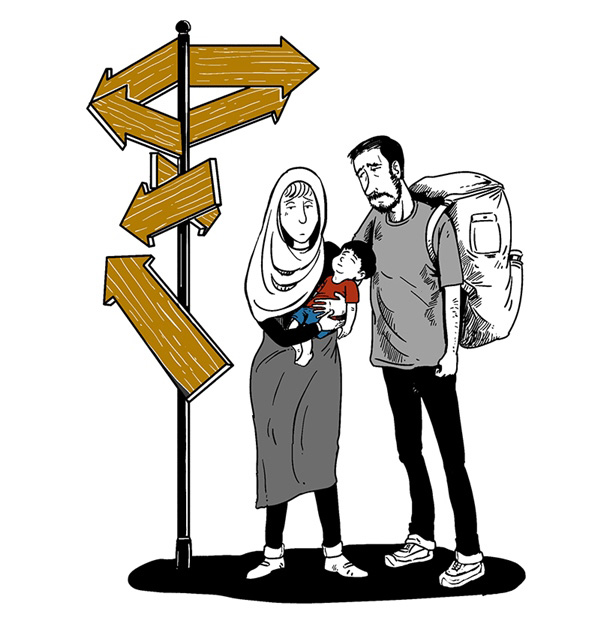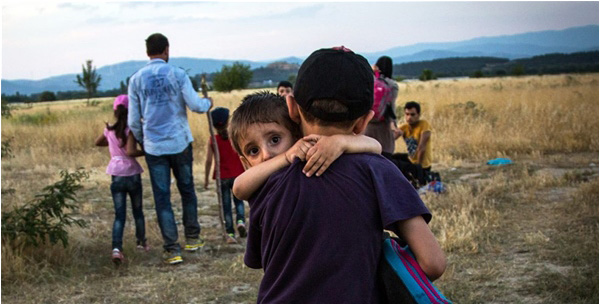
I learned the meaning of the term “using agency” from a Pakistani friend who is writing a book on how groups of women in Pakistan have improved their lot in life through their own collective action to force change in how they were treated. What “using agency” means simply is people taking charge of their own lives in ways which protect and improve those lives. They act on their own, without any agent acting for them. This is one, perhaps idiosyncratic, offshoot of the philosophical question of whether people have the capacity to make their own decisions and act independently or whether, fundamentally, those decisions and actions are determined by social and political structures, in other words by “an agent” of some sort.
What we are witnessing now, on an enormous scale, is that the endangered and often displaced people of the Middle East and South Asia, primarily Syrians and Afghans, but of other beleaguered and dangerous states (or in some cases, former states) as well have taken things into their own hands and are seeking places where they believe they can live safely and productively. Though not in large numbers, there are Pakistanis among them, running from the violence and danger they perceive in Pakistan. Lyse Doucet of the BBC has said it best, “…People are no longer waiting for a more peaceful and privileged world beyond to come to them with aid. They’re coming to that better, safer place themselves—no matter what it takes.” They are, in effect, using their agency to escape the violent disruption of their lives, and more importantly their total loss of hope for amelioration of that disruption that prevails now in Syria, Iraq, Afghanistan, and to some extent in other places of exodus, such as Libya. Many of them have come not from their countries of origin but from refugee camps in Lebanon, Turkey, and Jordan, where hope for their future and that of their children has long evaporated.

For 20 years – long before I had heard the term “using agency” in this context – I have been familiar with the idea of large groups of people using their agency to protect themselves. In April 1996, when hostilities broke out after a long hiatus in the Liberian civil war – and quickly spread through Monrovia as the factions fought among themselves and with the regional peacekeeping force for control of the city – refugees moved en masse from the dangerous parts of the city to parts in which they considered themselves protected. In fact, long before one could hear the shooting, one knew something was amiss from the stream of Liberian women and children, carrying (probably) all their worldly goods with them, on their way to safety.
These refugee women had already experienced serious violence and lost family members, and had moved from the dangerous countryside, where the murderous factions moved freely and unopposed, to the city for protection. They knew that they would not be protected from the predation of the warring factions (and I might add, that of the peacekeeping force itself) in the areas of the city where fighting was going on, so within minutes they were on the move again, this time to the only safe place they knew of – the US Embassy. Within hours of the start of the fighting, 25,000 people were asking peacefully and courteously for refuge in a 7-acre walled-off US housing compound called Greystone, across the street from the Embassy. We could not have prevented them from entering if we had wanted to, and we did not want to. For a period of 3 to 4 months, while the fighting went on around the city and around the Embassy, these 25,000 refugees remained safe from harm. (And as an aside, I will note that not one of the 7 houses on the compound was entered or damaged in any way. The refugees were conscious of their obligation to act lawfully in their protected environment.)
The Pakistani women’s success in improving their situation, as well as my Liberian experience, are microcosmic examples of people using their agency. I believe this happens frequently in many countries as likeminded people band together to achieve something they have been denied. But we are now seeing a macrocosmic example that stirs up conflicting emotions. Hundreds of thousands of people from various countries in various stages of civil strife are on the march to what they perceive is a renewed life – one in which they can work, raise and educate their children, and be safe and secure from the dangers of war and hopelessness. And they are marching out of the war zone of the Middle East and toward the peace and tranquility of the West. The primary objective is Europe, which for some is a march of a thousand miles, over water as well as land.
One would have thought that many European countries would have found good reason to welcome these migrants. And maybe they would have done so, had the trickle not turned to a flood in a matter of months. There are many reasons why they should be welcomed. Germany is the flagship of Europe on this question. Berlin has become the moral leader of the West these days – a statement that would have seemed outlandish only a few decades ago. Moreover it is a pragmatic voice recognizing that Western Europe needs migrants if it is to continue to grow and prosper in the 21st century. Fertility rates throughout Western Europe are below the replacement rate (although France is close to it) and most of these countries face the prospect of shrinking populations and aging work forces without immigration. In the past 20 years, for example, Germany has closed over 2,000 schools for lack of children. To think that millions of mainly young people with children are on the way should thrill the demographers and the far-sighted leaders of Western Europe.

But politics get in the way of progress as usual. The overwhelming numbers have created serious logistical problems for many European countries – especially those in Eastern Europe that the migrants want to pass through on their way to Germany and elsewhere in the West – and serious political problems for the European Union. I would be surprised if somehow these problems become reason to turn back the tide of migrants, but they may be the cause of some serious thinking in the EU about the viability of their experiment as a union of separate sovereign states – an experiment that Americans gave up on after about 10 years in 1789
We can’t leave the subject without mention of the other moral question. This migration is another legacy of the invasions of Iraq and Afghanistan. Right or wrong is not the question in this context, but those invasions set the dominoes falling across the Middle East and South Asia. Ultimately, these millions of people lost hope that they would ever have a chance of a normal life, or life at all, in those regions. Colin Powell said, “If you break it, you fix it.” Or, says Milam’s corollary, if you can’t fix it, you pick up the pieces.
What we are witnessing now, on an enormous scale, is that the endangered and often displaced people of the Middle East and South Asia, primarily Syrians and Afghans, but of other beleaguered and dangerous states (or in some cases, former states) as well have taken things into their own hands and are seeking places where they believe they can live safely and productively. Though not in large numbers, there are Pakistanis among them, running from the violence and danger they perceive in Pakistan. Lyse Doucet of the BBC has said it best, “…People are no longer waiting for a more peaceful and privileged world beyond to come to them with aid. They’re coming to that better, safer place themselves—no matter what it takes.” They are, in effect, using their agency to escape the violent disruption of their lives, and more importantly their total loss of hope for amelioration of that disruption that prevails now in Syria, Iraq, Afghanistan, and to some extent in other places of exodus, such as Libya. Many of them have come not from their countries of origin but from refugee camps in Lebanon, Turkey, and Jordan, where hope for their future and that of their children has long evaporated.

For 20 years – long before I had heard the term “using agency” in this context – I have been familiar with the idea of large groups of people using their agency to protect themselves. In April 1996, when hostilities broke out after a long hiatus in the Liberian civil war – and quickly spread through Monrovia as the factions fought among themselves and with the regional peacekeeping force for control of the city – refugees moved en masse from the dangerous parts of the city to parts in which they considered themselves protected. In fact, long before one could hear the shooting, one knew something was amiss from the stream of Liberian women and children, carrying (probably) all their worldly goods with them, on their way to safety.
These refugee women had already experienced serious violence and lost family members, and had moved from the dangerous countryside, where the murderous factions moved freely and unopposed, to the city for protection. They knew that they would not be protected from the predation of the warring factions (and I might add, that of the peacekeeping force itself) in the areas of the city where fighting was going on, so within minutes they were on the move again, this time to the only safe place they knew of – the US Embassy. Within hours of the start of the fighting, 25,000 people were asking peacefully and courteously for refuge in a 7-acre walled-off US housing compound called Greystone, across the street from the Embassy. We could not have prevented them from entering if we had wanted to, and we did not want to. For a period of 3 to 4 months, while the fighting went on around the city and around the Embassy, these 25,000 refugees remained safe from harm. (And as an aside, I will note that not one of the 7 houses on the compound was entered or damaged in any way. The refugees were conscious of their obligation to act lawfully in their protected environment.)
Germany has closed over 2,000 schools for lack of children
The Pakistani women’s success in improving their situation, as well as my Liberian experience, are microcosmic examples of people using their agency. I believe this happens frequently in many countries as likeminded people band together to achieve something they have been denied. But we are now seeing a macrocosmic example that stirs up conflicting emotions. Hundreds of thousands of people from various countries in various stages of civil strife are on the march to what they perceive is a renewed life – one in which they can work, raise and educate their children, and be safe and secure from the dangers of war and hopelessness. And they are marching out of the war zone of the Middle East and toward the peace and tranquility of the West. The primary objective is Europe, which for some is a march of a thousand miles, over water as well as land.
One would have thought that many European countries would have found good reason to welcome these migrants. And maybe they would have done so, had the trickle not turned to a flood in a matter of months. There are many reasons why they should be welcomed. Germany is the flagship of Europe on this question. Berlin has become the moral leader of the West these days – a statement that would have seemed outlandish only a few decades ago. Moreover it is a pragmatic voice recognizing that Western Europe needs migrants if it is to continue to grow and prosper in the 21st century. Fertility rates throughout Western Europe are below the replacement rate (although France is close to it) and most of these countries face the prospect of shrinking populations and aging work forces without immigration. In the past 20 years, for example, Germany has closed over 2,000 schools for lack of children. To think that millions of mainly young people with children are on the way should thrill the demographers and the far-sighted leaders of Western Europe.

Berlin has become the moral leader of the West
But politics get in the way of progress as usual. The overwhelming numbers have created serious logistical problems for many European countries – especially those in Eastern Europe that the migrants want to pass through on their way to Germany and elsewhere in the West – and serious political problems for the European Union. I would be surprised if somehow these problems become reason to turn back the tide of migrants, but they may be the cause of some serious thinking in the EU about the viability of their experiment as a union of separate sovereign states – an experiment that Americans gave up on after about 10 years in 1789
We can’t leave the subject without mention of the other moral question. This migration is another legacy of the invasions of Iraq and Afghanistan. Right or wrong is not the question in this context, but those invasions set the dominoes falling across the Middle East and South Asia. Ultimately, these millions of people lost hope that they would ever have a chance of a normal life, or life at all, in those regions. Colin Powell said, “If you break it, you fix it.” Or, says Milam’s corollary, if you can’t fix it, you pick up the pieces.

